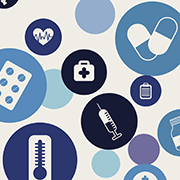Health IT Interoperability Needed to Drive Cancer Research
The future of cancer research depends on access to large volumes of clinical data, but the current lack of health IT interoperability is likely to prevent that future from being realized.

- In a recent report delivered last meet to the National Cancer Advisory Board, members of the Cancer Moonshot's Blue Ribbon Panel called for the creation of a national health IT infrastructure to support next-generation cancer research as one of many recommendations.

"Our ability to accelerate progress against cancer demands that researchers, clinicians, and patients across the country collaborate in sharing their collective data and knowledge about the disease," states the authors of the Cancer Moonshot Blue Ribbon Panel Report 2016.
Of the ten recommendations the group put forward, one calls for the development of a National Cancer Data Ecosystem that will allow those involved in cancer research "to contribute, access, combine, and analyze diverse data set related to cancer."
"This broad infrastructure," the authors continue, "will enable researchers to more effectively mine cancer-related data to develop new strategies to prevent, diagnose, and treat cancers as well as to understand the fundamental nature of the disease. It will also empower patients to take an active role in their care by providing useful knowledge about treatment options and appropriate clinical trials."
The report points to the fragmentation of valuable health data sources as an obstacle in the way of cancer research advancement.
READ MORE: NIH Grant Funds Machine Learning Tool for Chronic Disease Detection
"Many powerful sources of data are being rapidly generated in the research and clinical communities," the authors explain. "However, these are currently not being fully leveraged, due to the pace at which data are accruing, the lack of a coordinated effort to assemble the data in readily-accessible fashion, and the inability to effectively process the data in an inter-operative fashion."
Beyond health data exchange, the Blue Ribbon Panel's recommendation also identifies difficulties associative with patient access to health information and data aggregation as additional obstacles to advancing cancer research:
Even with the advent of electronic medical records, cancer patients know all too well the difficulties of accessing their own medical history, transferring their records from one provider to another, or integrating information among providers, for example between a primary health care provider and an oncologist. Patients are often highly motivated and interested in sharing their personal health information and accompanying insights and observations to advance research. However, while patient portals and forums exist, there is no single national infrastructure to enable straightforward contribution of data from patients or the receipt of personal health data.
Chief among its benefits to cancer research, the proposed National Cancer Data Ecosystem would facilitate health information exchange, healthcare analytics, and sharing of new treatments and clinical trials.
"Over time, the National Cancer Data Ecosystem will vastly improve the efficiency and effectiveness of the nation’s cancer research efforts by bringing powerful computational methods and vast amounts of data in an organized fashion in order to enable progress in cancer treatment and prevention," the report states.
READ MORE: Hartford Healthcare Partnership Focuses on Digital Health Innovation
In order to achieve its vision for a national health IT infrastructure for cancer research, the Blue Ribbon Panel is calling for the support of national organizations, both public and private, to coordinate the efforts of key stakeholders. Likewise, the group acknowledges the vital role of technology and innovation in supporting the generation, collection, and sharing of patient health data.
"In addition, important technological advances and societal shifts in attitudes toward data sharing have occurred, such as advances in cloud computing and machine learning, the data revolution, rapid generation of patient health data via wearable devices and other tools, and overall general acceptance of sharing personal data, all of which combine to make this an opportune time to initiate the infrastructure of a national cancer data sharing ecosystem," the panel notes.
In a recent interview with Charles Jaffe, MD, PhD, the Health Level Seven International (HL7) CEO addressed the role of Fast Healthcare Interoperability Resources (FHIR) — the specifications and application programming interface (API) — as potential vehicle for making clinical health data accessible for secondary and tertiary uses. As part of the Partners in Interoperability Program, stakeholders from the biopharma industry stand to benefit from widespread FHIR to avoid the high costs of running clinical trials and identifying participants.
"The double-blind, placebo-controlled clinical trial is an anachronism," said Jaffe. "It costs $2 billion to have a new chemical entity that only works half the time. So they realized by extracting data from the clinical record, they have far better understanding of condition, outcome, efficacy, and safety than they ever got from a clinical trial."
Additionally, Jaffe pointed to the use of FHIR in precision medicine — to which the concept of the cancer moonshot is related — to make use of genomic data.
READ MORE: Nuvance Health Pilots At-Home Remote Patient Monitoring Program
"A group of leaders in genomics are trying to tie this all together because if precision medicine is going to be successful, we'll need to be able to integrate data that is more than the somatic clinical data — the descriptions in phenotypic terms, that is," he added.
The support for various forms of national health IT infrastructure appears to be growing. The next step involves convening the right organizations and individuals to get things in motion.
Dig Deeper:
• Potential for Healthcare APIs to Revolutionize the Industry
• 5 Areas to Improve the Health IT Interoperability Experience
